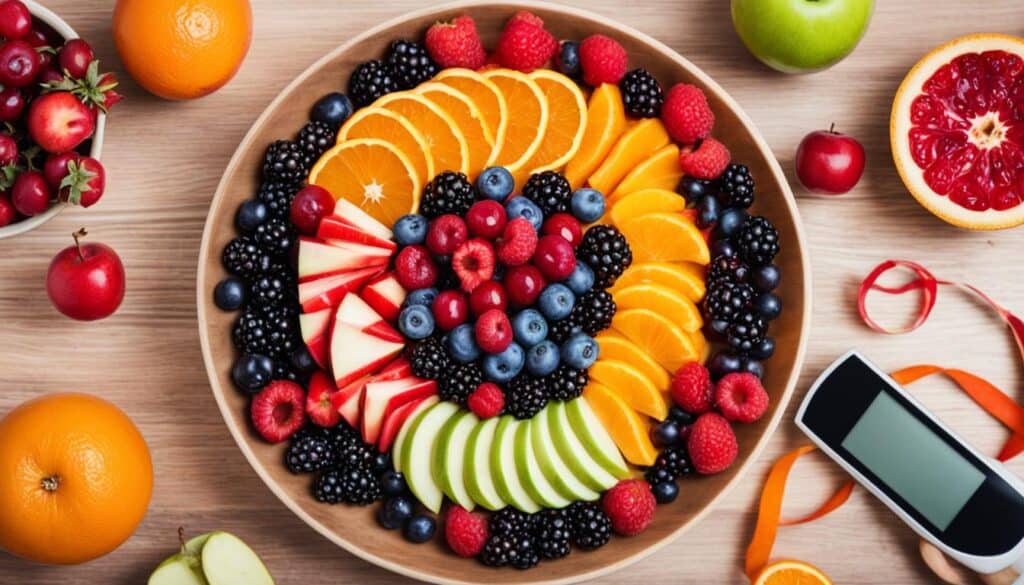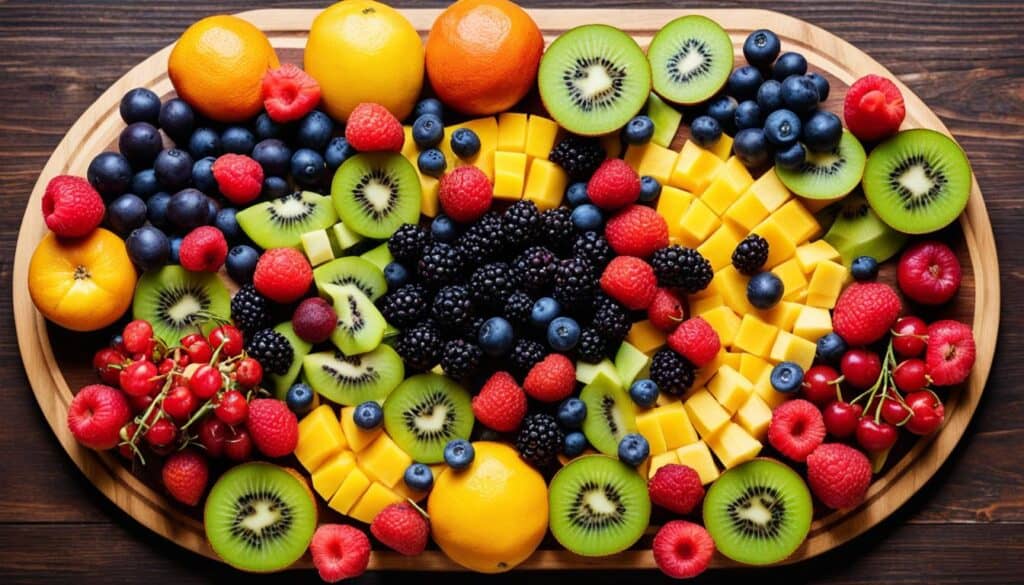When should you eat fruit in the day? What is the best time to eat fruit in a day? These are common questions for anyone looking to optimize their fruit consumption. While there is no definitive scientific evidence to support specific claims about the best time to eat fruits, understanding when and how to include them in your daily diet can help you maximize their health benefits and avoid any potential adverse effects.
Eating fruits in the right quantity and at the right time is essential for obtaining their nutritional benefits. While the timing may vary depending on personal preferences and lifestyle, there are some general guidelines to consider. Let’s explore them further.
Key Takeaways:
- Consuming fruits in the morning on an empty stomach can aid digestion, maintain weight, and provide energy for the day.
- Avoid eating fruits just before going to sleep to prevent potential spikes in blood sugar levels.
- Debunk popular myths about fruit timing, such as avoiding fruits with meals or worrying about nutrient value.
- Include fruits in between meals as a healthy snack option for satiety and overall well-being.
- Diabetic individuals can still enjoy fruits by considering low glycemic index options and pairing them with other high protein or fat meals.
Debunking Popular Myths about Fruit Timing
When it comes to fruit consumption, there are numerous myths and misconceptions about the best timing. Let’s take a closer look at some of these popular beliefs and separate fact from fiction.
Myth 1: Fruits should not be eaten with meals
Contrary to this belief, there is no scientific evidence to support the claim that eating fruits with meals causes digestive problems. In fact, incorporating fruits into meals can add nutritional value and promote overall health. Fruits provide essential vitamins, minerals, and fiber, which can enhance the nutritional profile of your meal.
Myth 2: Fruit nutrient value decreases when eaten before or after a meal
This myth suggests that consuming fruits before or after a meal diminishes their nutrient content. In reality, the nutrient value of fruits remains largely unaffected by the timing of consumption. Fruits are rich in vitamins, minerals, and antioxidants regardless of when they are eaten. It is important to focus on including a variety of fruits in your diet rather than worrying about precise timing.
Myth 3: Diabetic people should eat fruits separately from meals
This misconception arises from the concern that fruits, which contain natural sugars, may cause blood sugar spikes. However, diabetic individuals can safely consume fruits as part of their meals. Pairing fruits with other foods that have a high protein or fat content can help manage blood sugar levels more effectively. The key is to monitor overall carbohydrate intake and make informed choices about fruit selection.
In summary, it’s important to debunk these myths and understand that fruit consumption guidelines are not as strict as commonly believed. Eating fruits with meals is beneficial, and the nutrient value of fruits remains intact regardless of timing. Diabetic individuals can enjoy fruits as part of their meals while considering their overall carbohydrate intake. Let’s focus on incorporating fruits into our diets in a way that suits our individual preferences and promotes overall health.
| Myth | Fact |
|---|---|
| Fruits should not be eaten with meals | Eating fruits with meals does not cause digestive problems. |
| Fruit nutrient value decreases when eaten before or after a meal | The nutrient value of fruits remains largely unaffected by the timing of consumption. |
| Diabetic people should eat fruits separately from meals | Diabetic individuals can safely consume fruits as part of their meals. |
The Truth About Eating Fruits After 2:00 PM
There is a widespread belief that eating fruits after 2:00 PM can lead to weight gain and raise blood sugar levels. However, I’m here to debunk this claim and provide you with the truth about fruit consumption timing.
Contrary to popular belief, there is no scientific evidence to support the notion that consuming fruits after 2:00 PM has adverse effects on your health or weight. While it’s true that our body’s carb tolerance may fluctuate throughout the day, these variations are not significant enough to significantly impact our overall metabolic rate.
When it comes to the best time to eat fruit in a day, the key is to focus on incorporating a variety of fruits into your diet at any time that suits your personal preference and lifestyle. It is recommended to consume low-calorie and high-fiber fruits as part of a meal to maximize their health benefits and support weight loss.
Now, let’s take a look at a table that showcases some nutritious fruits and their calorie and fiber content:
| Fruit | Calories per 100g | Fiber per 100g |
|---|---|---|
| Apple | 52 | 2.4g |
| Kiwi | 61 | 3g |
| Strawberries | 32 | 2g |
| Oranges | 43 | 2.4g |
| Watermelon | 30 | 0.6g |
| Papaya | 43 | 1.7g |
| Banana | 96 | 2.6g |
| Guava | 68 | 5.4g |
Table: Nutritious fruits to include in your daily diet.
As you can see, these fruits offer a range of essential nutrients and are rich in fiber, making them excellent choices for maintaining a healthy and balanced diet.
Remember, there is no optimal time for fruit consumption that applies to everyone. It’s all about finding what works best for you. So go ahead and enjoy a nutritious fruit snack whenever it suits your schedule!
Fruit Intake for Diabetic Individuals
As a diabetic individual, you can still enjoy the benefits of fruits in your diet. However, it’s important to be mindful of your carbohydrate and sugar intake. Opt for fruits with low glycemic index rates and high fiber content, such as cherries and plums, as they can be eaten at any time during the day without causing major spikes in blood sugar levels.
To manage your blood sugar levels effectively, it’s recommended to pair fruits with other high protein or fat meals. This combination helps slow down the absorption of sugars and promotes better blood sugar control. Aim for a balanced plate that includes a variety of fruits, lean proteins, healthy fats, and whole grains.
It’s also crucial to keep an eye on the overall calories intake from fruits. While fruits are nutritious and beneficial, they still contain natural sugars and calories. As a general guideline, aim for fruit calories to make up less than 12% of your total daily calorie intake. This will help you maintain a balanced and healthy diet while managing your blood sugar levels.
Remember, consulting with a healthcare professional or a registered dietitian is essential to create a personalized meal plan that suits your specific needs and medical condition.
| Fruit | Glycemic Index (GI) | Fiber Content |
|---|---|---|
| Cherries | 22 | 1g per 10 cherries |
| Plums | 24 | 2g per plum |

I believe that with mindful choices and proper portion control, individuals with diabetes can include fruits as part of their overall healthy eating plan.
By selecting fruits wisely and incorporating them into a balanced diet, you can enjoy the nutritional benefits and delicious flavors without jeopardizing your blood sugar control.
The Benefits of Fruit Consumption for Weight Loss
Fruits can play an important role in weight loss journeys due to their high fiber content and numerous health benefits. Incorporating fruits into your diet can help increase feelings of satiety and prevent overeating, making them a valuable addition to any weight management plan.
When it comes to weight loss, consuming fruits before a meal or as a snack can be particularly beneficial. The fiber in fruits helps to slow down digestion and promote a feeling of fullness, which can prevent you from consuming excess calories. So, the next time you’re feeling hungry before a meal, reach for a piece of fruit to help curb your appetite.
Fruits are also low in calories per serving, making them a great choice for those looking to shed extra pounds. Their natural sweetness can satisfy cravings for sugary snacks while providing essential vitamins and phytochemicals that support overall health.
When it comes to specific fruits, some have shown an anti-obesity effect. For example, watermelon and apples have been found to have properties that can aid in weight loss. Watermelon is rich in water content, which helps to keep you hydrated and feeling full. Apples contain a type of fiber called pectin, which has been shown to reduce appetite and promote feelings of fullness.
While there is no specific “perfect” time to eat fruits for weight loss, incorporating them into a balanced diet and managing overall calorie intake is key. Focusing on portion control and including a variety of fruits throughout the day can help you achieve your weight loss goals.
To give you a better idea of the nutritional value and calorie content of some commonly consumed fruits, take a look at the table below:
| Fruit | Calories per Serving | Nutritional Benefits |
|---|---|---|
| Banana | 105 | High in potassium and vitamin C |
| Strawberries | 29 | Rich in antioxidants and fiber |
| Watermelon | 30 | Hydrating and contains lycopene |
| Apple | 95 | High in fiber and vitamin C |
| Orange | 62 | Excellent source of vitamin C and fiber |
Remember, weight loss is a journey that requires a holistic approach. While fruits can support your goals, it’s essential to maintain a well-balanced diet and incorporate other healthy lifestyle habits, such as regular exercise and adequate sleep.

Keep in mind that individual needs and preferences may vary when it comes to fruit consumption, so it’s important to listen to your body and make choices that align with your specific goals and dietary requirements.
By incorporating a variety of fruits into your daily diet and paying attention to portion sizes, you can enjoy the benefits of fruit consumption while working towards your weight loss goals.
Benefits of Morning Fruit Consumption
Eating fruits in the morning is essential for a healthy and nutritious start to the day. With their high fructose content and easy digestibility, fruits provide a quick energy boost after a period of rest, helping to kick-start the body’s daily activities. Incorporating fruits into your morning routine can offer numerous benefits, such as aiding in detoxification and supporting weight loss goals.
When consumed on an empty stomach, fruits have a cleansing effect on the digestive system, promoting detoxification and improving overall gut health. The fiber and water content in fruits help to flush out toxins, making them an excellent choice for a morning cleanse.
Fruits are also low in calories and high in fiber, making them an ideal addition to a weight loss diet. By incorporating fruits into your morning meal, you can increase feelings of fullness and reduce the likelihood of overeating throughout the day. The fiber in fruits helps slow down digestion, promoting satiety and preventing unnecessary snacking.
Having a breakfast rich in fruits can also provide a wide range of essential vitamins, minerals, and antioxidants, ensuring your body gets a healthy dose of nutrients right from the start of the day. Fruits are packed with immune-boosting vitamin C, heart-healthy potassium, and cancer-fighting antioxidants, among other beneficial compounds.
Nutritionists recommend including a variety of fruits in your morning meal to maximize their benefits. Whether it’s a bowl of mixed berries, a refreshing citrus salad, or a delicious smoothie, starting your day with a fruit-rich breakfast sets the tone for a nutritious and energized day ahead.

Embrace the benefits of morning fruit consumption and prioritize your health and well-being from the moment you wake up.
Benefits of Eating Fruits In Between Meals
Snacking on fruits in between meals is a wonderful habit that offers numerous health benefits. Not only does this timing coincide with the body’s efficient digestion of food, but it also allows for effective utilization of enzymes to break down fruits. Fruits also play a significant role in keeping you satiated for longer periods, preventing hunger between meals.
To enhance the nutritional value of your snacks, consider combining fruits with nuts and seeds. This combination provides a well-rounded and nutritious snack that satisfies your taste buds and keeps you energized throughout the day. The fiber in fruits aids in promoting fullness, which can prevent overeating during subsequent meals.
Research has demonstrated that daily banana consumption in between meals can reduce the intensity of pain caused by Irritable Bowel Syndrome (IBS). By incorporating fruits into your snacking routine, you can enjoy both delicious flavors and potential health benefits.
| Fruit | Health Benefits |
|---|---|
| Apples | Rich in antioxidants and fiber; promote heart health |
| Kiwis | Packed with vitamin C and fiber; support immune system function and aid digestion |
| Strawberries | High in antioxidants; contribute to brain health and reduce inflammation |
| Oranges | Excellent source of vitamin C; boost immunity and support collagen production |
| Watermelons | Hydrating and low in calories; aid in maintaining healthy skin |
| Papayas | Rich in vitamin C and folate; support digestion and provide antioxidant benefits |
| Bananas | High in potassium and fiber; promote heart health and aid digestion |
| Guavas | Packed with vitamin C and fiber; support immune system function and aid digestion |
Including a variety of these nutritious fruits in your daily diet ensures you receive essential vitamins, minerals, and phytochemicals. Each fruit offers its unique set of health benefits, contributing to overall wellness. Whether you prefer tart apples, juicy oranges, or vibrant strawberries, there’s a fruit to suit every taste and dietary need.
Avoiding Fruit Consumption before Bed
When it comes to fruit consumption, timing is key. While fruits offer numerous health benefits, it is important to be mindful of the timing of their intake, especially before bedtime. Eating fruits right before going to bed can cause spikes in blood sugar levels, which may interfere with a good night’s sleep.
It is recommended to avoid consuming fruits close to bedtime to ensure proper sleep. Giving at least an hour or two after eating fruits allows the body to absorb their nutrients effectively without causing any disruptions to sleep patterns. By following this healthy fruit eating time practice, you can enjoy the goodness of fruits while promoting a restful night’s sleep.
Ensuring a peaceful night’s sleep is essential for overall well-being. By avoiding fruit consumption before bed, you can prioritize your sleep and wake up feeling refreshed and energized.
Nutritious Fruits to Include in Your Daily Diet
Including a variety of fruits in your daily diet is essential for maintaining good health and obtaining a wide range of vitamins, minerals, and other beneficial compounds. Here are some of the most nutritious fruits that you should consider including in your diet:
| Fruit | Nutrients | Health Benefits |
|---|---|---|
| Apples | Fiber, vitamin C, antioxidants | Improves heart health, aids in digestion |
| Kiwis | Vitamin C, vitamin K, fiber | Boosts immune system, supports healthy skin |
| Strawberries | Vitamin C, manganese, antioxidants | Enhances brain function, reduces inflammation |
| Oranges | Vitamin C, potassium, folate | Strengthens immune system, promotes heart health |
| Watermelons | Vitamin A, vitamin C, lycopene | Hydrates the body, supports healthy skin |
| Papayas | Vitamin C, vitamin A, folate | Aids digestion, boosts immune function |
| Bananas | Potassium, vitamin B6, fiber | Regulates blood pressure, boosts energy levels |
| Guavas | Vitamin C, dietary fiber, antioxidants | Improves digestion, supports healthy skin |
These fruits offer a range of essential nutrients and health benefits that contribute to overall wellness. Incorporating them into your daily diet can help improve your immune system, maintain a healthy weight, and protect against chronic diseases.
Remember to choose fresh, ripe fruits and consume them at their peak freshness to maximize their nutritional value.

Conclusion
While there is no specific best time to eat fruits, it is important to incorporate them into a balanced diet. Fruits can be enjoyed at any time of the day, depending on personal preference and lifestyle. They provide essential nutrients, vitamins, and minerals, and offer numerous health benefits.
It is recommended to manage fruit intake based on individual goals, such as weight loss or blood sugar management. Incorporating fruits into meals or snacks can contribute to a healthy and nutritious diet. Whether you prefer a morning fruit bowl, a midday fruit smoothie, or an evening fruit salad, there are plenty of ways to enjoy the delicious and beneficial nature’s treats.
Remember to choose a variety of fruits to ensure a diverse nutrient intake. Apples, kiwis, strawberries, oranges, watermelons, papayas, bananas, and guavas are just a few examples of nutrient-packed fruits that can be included in your daily diet.
So, don’t hesitate to reach for a juicy and colorful fruit throughout the day – it’s a tasty way to boost your well-being and promote a healthier lifestyle!
FAQ
What is the best time to eat fruit in a day?
There is no scientific evidence to support claims about the best time to eat fruits, such as morning or afternoon. However, eating fruits on an empty stomach in the morning can improve digestion, maintain weight, and provide energy for the day.
Are there any myths surrounding fruit consumption timing?
Yes, there are several myths surrounding the right time to eat fruits. These include claims that fruits should not be eaten with meals, that fruit nutrient value decreases when eaten before or after a meal, and that diabetic people should eat fruits separately from meals. However, these myths lack scientific evidence.
Does eating fruits after 2:00 PM raise blood sugar levels and lead to weight gain?
No, there is no scientific evidence to support this claim. Your body’s carb tolerance may fluctuate throughout the day, but these changes are not enough to significantly affect the overall metabolic rate. It is recommended to have a low-calorie and high-fiber fruit with a meal at any time of the day for weight loss and overall health benefits.
Can diabetic individuals include fruits in their diet?
Yes, diabetic individuals can still include fruits in their diet but should be mindful of their carbohydrate and sugar intake. It is important to pair fruits with other high protein or fat meals to manage blood sugar levels. Diabetic individuals should also be cautious about the overall calories intake from fruits, aiming for below 12% of their total calories.
Can eating fruits help with weight loss?
Yes, fruits can be helpful for weight loss due to their high fiber content. Consuming fruits before a meal or as a snack can help to increase feelings of satiety and prevent overeating. Fruits are low in calories per serving and provide essential vitamins and phytochemicals. However, there is no specific “perfect” time to eat fruits for weight loss. It is important to incorporate fruits into a balanced diet and manage overall calorie intake.
Why is morning fruit consumption recommended?
Eating fruits in the morning is recommended due to their high fructose content and easy digestibility. Morning fruit consumption provides a quick energy boost after a period of rest and helps kick-start the body’s daily activities. Eating fruits on an empty stomach in the morning can also aid in detoxification and weight loss.
Are there benefits to eating fruits in between meals?
Yes, snacking on fruits in between meals is a great habit as this is when the body digests food quickly and secretes enzymes to digest fruits effectively. Fruits also help keep you full for longer periods and can be combined with nuts and seeds for a nutritious snack.
Should I avoid eating fruits before bed?
Yes, it is recommended to avoid consuming fruits close to bedtime as it can cause spikes in blood sugar levels, which may interfere with a good night’s sleep. Giving at least an hour or two after eating fruits allows the body to absorb their nutrients effectively.
What are some nutritious fruits to include in my daily diet?
Some of the most nutritious fruits to include are apples, kiwis, strawberries, oranges, watermelons, papayas, bananas, and guavas. These fruits offer a range of essential nutrients and health benefits for overall wellness.
Is there a specific conclusion about the best time to eat fruits?
While there is no specific best time to eat fruits, it is important to incorporate them into a balanced diet. Fruits can be enjoyed at any time of the day, depending on personal preference and lifestyle. They provide essential nutrients, vitamins, and minerals, and offer numerous health benefits. It is recommended to manage fruit intake based on individual goals, such as weight loss or blood sugar management. Incorporating fruits into meals or snacks can contribute to a healthy and nutritious diet.





Leave a Reply